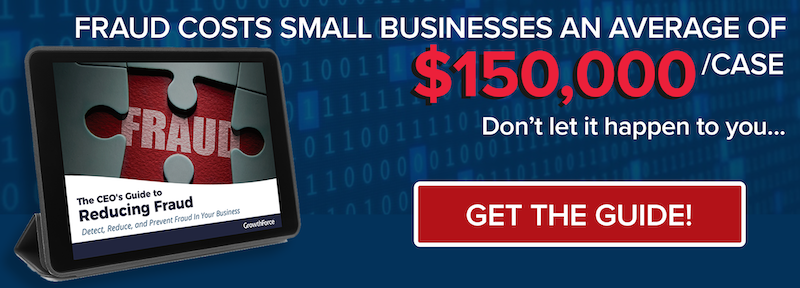6 min read

Embezzlement - misappropriation, theft, stealing, robbery, thieving, pilfering, purloining, pilferage, appropriation, swindling, fraud, larceny - the theft or misappropriation of funds placed in one's trust or belonging to one's employer.
Call it by any name, but its effect is detrimental to any business—and you don't want yours to be next.
|
Key Takeaways
|
Unfortunately, if you were to do a Google Search of Bookkeeper theft, you would find endless pages of bookkeeping fraud stories, and they are far too many to include in this post.
 Detection of embezzlement is difficult when your bookkeeper is the culprit, as they have the knowledge and ability to manipulate your financial records and books. If you have suspicions your bookkeeper may be stealing, look for tell-tale signs.
Detection of embezzlement is difficult when your bookkeeper is the culprit, as they have the knowledge and ability to manipulate your financial records and books. If you have suspicions your bookkeeper may be stealing, look for tell-tale signs.
Be alert to warning signs in employee behavior
It’s important to remember the human factor in fraud.
Fraudulent acts can be triggered by external factors in an employee’s life, such as personal debt and other financial pressures due to medical bills, a spouse losing a job, or an ailing parent moving in. There can also be other factors, such as drug or alcohol use, gambling or an inability to curb spending. These issues can, in some cases, be accompanied by a change in behavior.
Change in Habits
Sometimes an employee becomes disorganized, dissatisfied or withdrawn. In some cases, employees suddenly start making a lot of personal calls.
It’s important to keep in mind that behavioral changes can occur for all sorts of reasons, and the chances they’re linked to fraudulent behavior are small.
Too often, we're suspicious of the office under-achiever and not those burning the midnight oil. However, if your bookkeeper, office manager, or any employee with private access to the company's books, products or property suddenly acquires new habits, such as coming to the office on weekends, working through vacation time or working longer hours, it's important to take notice.
Any of these red flags may be reason enough to keep a closer watch on the books and the employee.
Experiencing Financial Difficulties
More often than not, embezzlers are under some kind of stress or emotional pressure that forces them to commit embezzlement.
Sudden Debt - Drug addiction, divorce, gambling, etc. are some key factors that may lead to sudden debt and financial difficulties. Under these circumstances, it doesn't matter if they are a junior or a senior employee, a women or a man, or if they are young or old, anyone can be a potential threat to your business.
Living Beyond One's Means - Big houses, high priced vehicles and luxurious vacations aren't bad, if it's affordable. However, there are times when people tend to live beyond their means.
Overspending, taking out loans for more than they can manage, and running up high credit debt are far too common, causing financial strain and personal stress. This can affect people in ways that may lead them to take the risk of theft, even if they have no prior record.
Exhibiting Control Issues
You might notice your bookkeeper wants to control all of the financial management functions. For example, if they are the only person who enters bills, they should not be the person who applies the payments as well. For this reason, it is critical to have separation of duties and a system of Internal Controls.
Sometimes, the reason employees steal is that you've made it just too darn easy for them! Blind trust is not an Internal Control, and when an employee has easy and unsupervised access to your company's assets with no formal system of accountability, then you are leaving your company's vault wide open.
Preventing Bookkeeper FRAUD
The most fundamental way to reduce the risk of fraud is to set up internal controls. At the most basic level, that means job duties need to be separated.
It’s important to understand that no system of internal controls can completely eliminate the risk of fraud. All it can do is make it harder for fraudsters to steal or increase the odds that they get caught quickly so you reduce the risks to a minimum. If two employees are colluding, that’s hard to spot. It’s not impossible; just harder.
Here are three ways to help you reduce the risk of fraud in your business:
1. Create Separation of Duties
The principle of separation (or segregation) of duties is the cornerstone of a solid internal control system. In fraud prevention, separation of duties involves dividing the critical duties into the three primary accounting and bookkeeping functions between two or more employees or departments.
Ensure that you distribute financial duties and responsibilities among your employees. The roles must be well defined and divided; an employee who makes the bank deposits should not collect checks and cash from the clients and vice-versa. For example, one person can be put in charge of receiving merchandise while another employee is assigned the task of order taking. And, the person reconciling the bank statements should never be the person writing the checks.
2. Establish Internal Controls
Control Access
One of the best ways to prevent embezzlement is to limit a bookkeeper’s access to signature stamps, blank checks and cash. Requiring a counter signature on all checks is another precautionary means to prevent fraudulent behavior. Then, conduct surprise audits periodically to either detect theft earlier, or prevent it from occurring in the first place. This is one of the best ways to detect possible discrepancies in the financial and accounting records.
Be Systematic
Many small business owners are looking for fraud prevention strategies that won't break the bank. For businesses using QuickBooks®, there are several built-in functions that can do this for you, but you have to take the time to set it up right.
Every defined limitation provides another obstacle to theft.
However, too frequently, the set up process is rushed and these critical safeguards are overlooked. You should never default everyone to full administrator rights, share logins and passwords, or give accounts to employees who really have no need for one.
Have no fear, with QuickBooks, it's never too late to go back and establish permissions! First, determine each user's role and base access and permissions on his or her job responsibilities. You can limit their rights to accounts payable records or give permissions to create transactions, while preventing them from completing transactions.
If you are the Administrator, go to Company Menu > Set Up Users and choose the user whose permissions you want to change and click Edit User. After making your changes, click next through the screens, then verify your changes at the end before clicking Finish. Voila!
3. Leverage Outsourcing
One of the most effective ways to reduce your risk of fraud is to outsource your bookkeeping, accounting and control functions to an experienced provider. This eliminates the risks associated with a lack of internal controls and ensures that every transaction is checked for accuracy.
Companies like GrowthForce, possess decades of experience and have the expertise to flag and follow up on irregularities as soon as they arise.
The truth is that the more people you have overseeing your books, the less attractive your company becomes as a target for fraudsters. So in addition to providing a significant amount of protection, outsourcing also gives you peace of mind.
The vast majority of bookkeepers do a wonderful job and are ethical in their dealings with their clients and employers. But as the old saying goes, an ounce of prevention is worth a pound of cure.
Instituting fraud prevention strategies, as well as recognizing the early warning signs, will not only help you control the situation, but save you plenty of time and money down the road.
Learn how our outsourced bookkeeping and controller services can not only protect against fraud, but also deliver timely and accurate financial information.
Transition to a dedicated GrowthForce team of professionals with the expertise to implement a smart back office for your business.

.png?width=563&height=144&name=New%20GF%20Logo%20(37).png)

